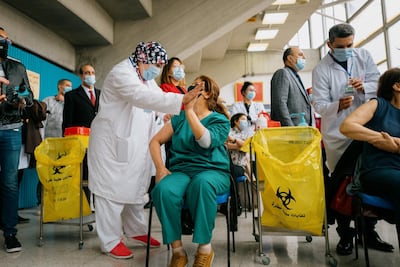After more than a year of treating patients suffering with Covid-19 at a local hospital, Tunis nurse Meherzia Hammami, 54, was the first person to receive a vaccine against the coronavirus in Tunisia.
"It means a lot to me," said Ms Hammami, visibly moved.
She said she had cared for hundreds of patients, many of whom succumbed to the virus – including members of her own family.

The vaccination effort comes more than a year after the first confirmed case of Covid-19 in Tunisia. The country has since seen nearly 250,000 cases, with more than 8,300 deaths.
According to Red Crescent officials, 25 regional vaccine centres will begin inoculations on Saturday, and will target frontline health workers.
"This is a message of hope to Tunisians," said Abdelmoumen Samir, 62, an emergency room doctor who was among the six medical workers to receive the vaccine at a ceremony this morning.
Mr Samir said he hopes to inspire confidence in the system and encourage others to get the vaccine.

Cases surged in Tunisia in January and the country was put on a full lockdown for four days around the 10th anniversary of the Tunisian Revolution.
Tunis Regional Health Director Tarek Ben Naceur told The National that the initial doses will be distributed to healthcare workers across the country.
"We are following the World Health Organisation recommendations," Mr Ben Naceur said, "so we will be starting with healthcare workers.
"We will be giving priority to those having direct contact with Covid-19 patients.”
Health workers who perform Covid-19 tests at sites around the country will also receive the jab.
Vaccine diplomacy
An initial 30,000 doses of Russia’s Sputnik V vaccine arrived in Tunis earlier this month, with another 500,000 vaccine doses due in the coming weeks.
This includes 96,300 doses of the Pfizer-BioNTech vaccine, expected within the fortnight, and up to 100,000 doses of the Sinovac vaccine, donated by China.
Regional hubs have been created, with capacity to vaccinate up to 800 people a day, Mr Ben Naceur said.
But a major hurdle to administering those doses is getting people to sign up.
Tunisians can only register to receive the vaccination through an online system, called Evax, the government's first all-digital health system.
To date, just 500,000 people have signed up – out of a government target of five million, said Mr Ben Naceur.
While most households in the wealthier cities on the coast have internet access, internet saturation in the poorer interior of the country, which has been hit harder by the virus, is considerably lower.
"At least 50 per cent of the population needs to be registered," Mr Ben Naceur said.
“We believe registrations will increase once people see big officials getting their shots and check with healthcare workers.”
Tunisia's vaccination campaign failed to launch in February when a shipment of the Pfizer vaccine, supplied by the international Covax vaccine initiative, was delayed.
Since then, a political row between Prime Minister Hichem Mechichi and President Kais Saied has led each to aggressively pursue the procurement of vaccine doses in a bid to win over popular opinion.
But many see the diplomatic competition as a boon – if it means more doses of the vaccine will be getting into the actual arms of Tunisian citizens.
"I see it as a positive thing," said Mr Ben Naceur.
"It has become a competition to see who can be more effective at bringing in the vaccine."
Regardless of the squabble, he believes the Tunisian people will come out on top.
Ghaya Ben Mbarek contributed reporting


